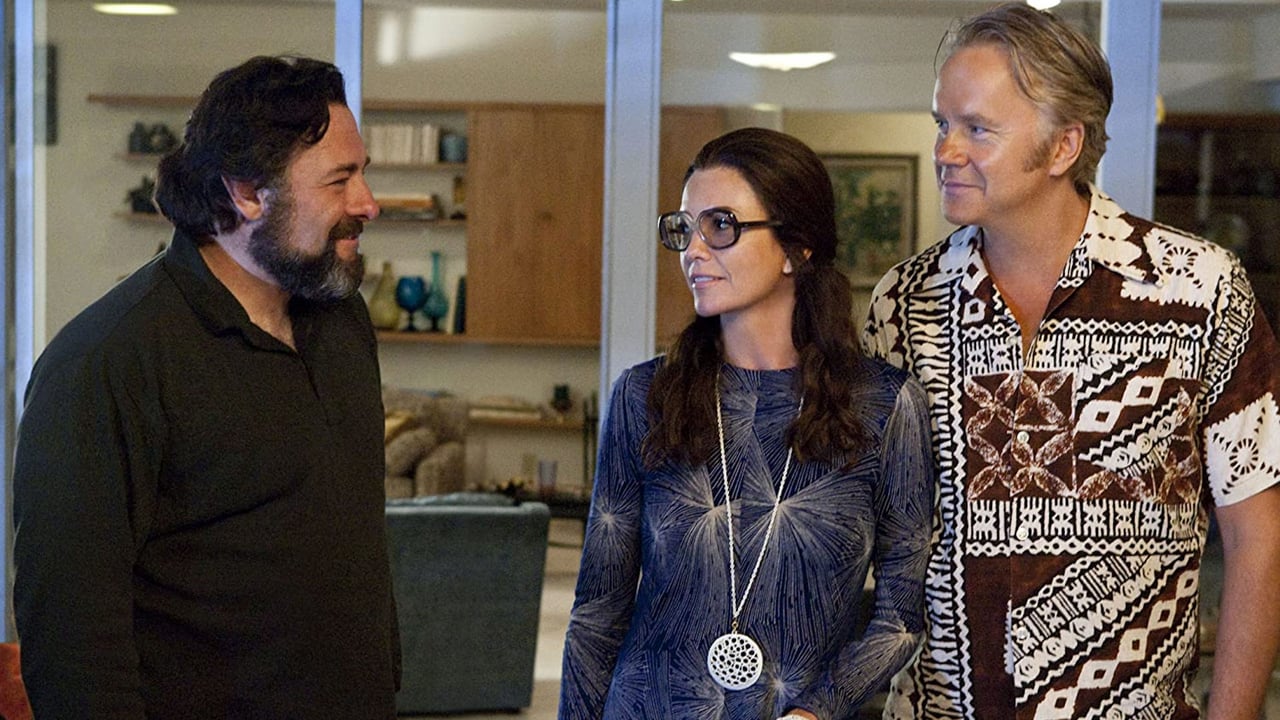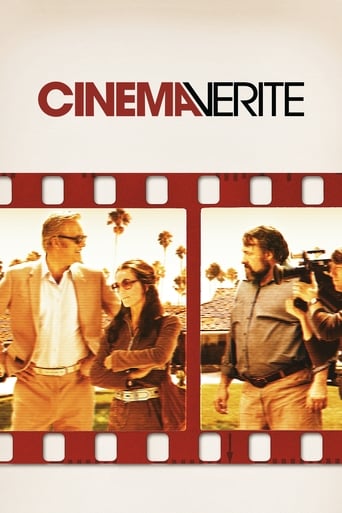

In 1971 an all American family from Santa Barbara in California were chosen, seemingly at random, to take part in a TV experiment. It was to become the world's first reality TV show called "An American Family" and its stars, the Loud family – both by name and at times by nature, were to become national phenomena.But to get to legendary status the show's producer, Craig Gilbert, had a pretty hard sell to the board of TV company PBS who were reluctant, to say the least, to commit to the show and began to baulk at the cost of production as the film stock costs (in particular) began to mount.Their concern was about the "view-ability" of the show and whether it would find an audience. They needn't have worried because what gradually emerged was a tale of a swinging misogynist father (Tim Robbins), a hopeless and helpless (but sultry in Gilbert's opinion) Mom played brilliantly by Diane Lane and a screamingly gay son, Lance, played gleefully by Thomas Dekker. Not to mention a looky-likey Rolling Stones band fronted by the other two boys.But it's what's going on in the mind of Producer Gilbert (played masterfully by James Gandolfini with a very unlikely full beard and absolutely no gangster element whatsoever to draw on) that is the meat of the movie. Well, I say a movie but it's actually a documentary set within a drama, about a reality TV documentary that turns out larger than life than any drama.At points we see side by side comparisons between the "real" family and the 2011 actors. It's uncanny. Gandolfini manipulates all sides as he makes the "action" more and more interesting but in doing so contributes to the family meltdown and the confidence of his crew. It's terrific.I don't think this ever made it to cinema, it's an HBO production, but it's great and I saw it last night on Sky Atlantic so is likely to be repeated at some time. If it is tune in because it's a little gem.
... View More"One must never let the public behind the scenes for they are easily disillusioned and then they are angry with you, for it is the illusion they love." The first successful reality show was on PBS and it was about the Loud family. The show followed around Pat (Lane) and Bill (Robbins) Loud and their family. It was the first of it's kind and this movie about how it started, what it was like while it was going on and the aftermath. I was actually pretty excited about watching this because of the cast. I have to say I was not disappointed at all. The acting was great in this and the movie itself was very entertaining. I have never been a fan of reality TV but it was very interesting to see how the genre began and the immediate impact that the show had. I do have to say though that as great as this movie is and how interesting it was to see the family problems come to the surface I still have no interest to watch the real "American Family" show. That in no way means that I did not enjoy watching the Loud family in this movie though. Overall, an excellent movie that should be watched. Very, very interesting and makes me wonder how accurate it is. I give it an A-.
... View MorePBS was a pioneer in many areas of what is seen in television today. The impact "An American Family" had on our culture cannot be measured; it was something like no American audiences had experienced before. The openness of the Louds being themselves on a weekly basis was revolutionary at best. "Cinema Variete" wants to take today's viewers to the story behind the reality show.The ideal American family was found for producer Craig Gilbert by a friend of the Louds, who thought they would be perfect for what the producer wanted to achieve. Pat and Bill Loud had four children and led a comfortable life in Santa Barbara, California. Pat was a woman that exuded intelligence, as noted during her first encounters with Gilbert. She had her doubts about how the program would play, but evidently she thought it would be a great idea, but little did she suspect how it would change her life, and that of her family. Bill Loud was something else, he was a philandering man if he was given the opportunity to have sex outside the home.The film concentrates on the technical aspects more than in the family members. The only one that is showcased was Lance, a young man obviously in awe of himself and his wit. Santa Barbara was perhaps too provincial for him to express his artistic bent, so he fled to New York where he was able to be what he wanted to be in an open atmosphere, away from his parents and small town gossip. The other kids are not even given a thought in the film, even though they were prominently seen in the weekly programs.Robert Pulcini and Sharon Springer Berman share the directorial credit. The screenplay is by David Seltzer who tried to explain the new phenomenon on public television in a film format. Because of the limitations trying to condense the series into something that resemble a movie, the creators only touch on their subject without going too deep behind the real family.Diane Lane's Pat is one of the best things we have actually seen her do in recent memory. Her resemblance to the real Pat Loud is uncanny. Tim Robbins take on Bill is not quite right, although he also resembled the man he is portraying. James Gandolfini plays Craig Gilbert, a man with a vision that revolutionized the way we watched television shows. Thomas Dekker is seen as the flamboyant Lance Loud.
... View More"Cinema Verite" may be a new art form: a drama shot in semi-documentary style about a documentary series (shot in 1971, televised nationally in 1973) which itself hovered between the spontaneous and the rehearsed. This 90-minute effort takes about a third of its running time time to get off the ground, but when it does it becomes fascinating as both sociology and drama. At first it seems as if there is no point in re-enacting the back story to the famous series that followed the ups and downs of the upper-middle-class Loud family of Santa Barbara. Nothing particularly interesting happens as a producer (James Gandolfini) talks a married couple (Diane Lane and Tim Robbins) into allowing cameras into their lives for an unprecedentedly close look at the perfect American family. The real drama begins only when the participants are forced to grapple with the big choices (what and what not to film, what and what not to do when the camera is rolling, how to handle the fact that their lives have decisively changed once the cameras entered). The actors here give themselves totally to this multi-leveled process and come out with flying colors. We see the actual Loud family in snippets from the original series juxtaposed with their contemporary impersonators who seamlessly fill their shoes, sometimes in mid- conversation. The casting is very good; the resemblances are striking. (But as close a match as Diane Lane is to Pat Loud, Demi Moore would have been even closer.) Some clever member of the creative team even decided to frame the whole enterprise with Mama Cass's 1969 song hit "Dream a Little Dream of Me" (originally a hit in 1931, about 40 years before "An American Family"'s time), allowing the song to surface again, 40 more years down the road, as underscoring to an examination of "the first reality show." A neat touch.One thing they got wrong was the performance of the underground play "Vain Victory" which the mother attends in the company of her gay son, Lance. The performers and venue for such ragtag productions were a lot funkier than depicted in this otherwise spot-on production. Of course, by 2011 cultural standards such drag acts are as tame and commonplace as Twinkies, but they were enough to drive Pat Loud out of the room back in '71.
... View More